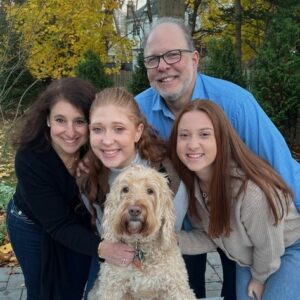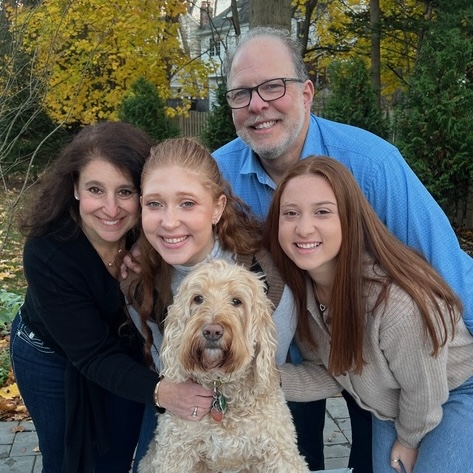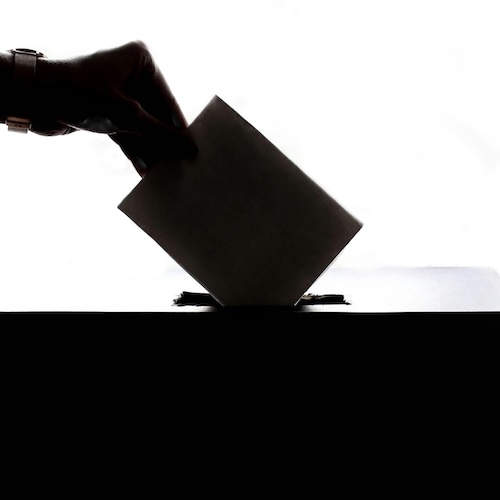
If you had asked me ten years ago if our children would have to face antisemitism in their lifetimes, I would have said emphatically no. Yes, there are individuals who are antisemitic, but the idea of systemic wide-spread antisemitism was reserved for other countries and histories.
Since then, sadly and shockingly, I learned how wrong I was. Our community has seen a shift: October 7th surfaced and exacerbated antisemitic hate, often cloaked as “anti-Israel.” Hateful experiences are surging on college campuses. My husband and I have front row seats to the hatred students face on many campuses.
Our eldest daughter, Shoshana, attended The Rashi School, Gann Academy, Jewish summer camp, traveled to Israel, and participated in Havaya at TBE. We did what we thought we should do: we gave her the sense of self and knowledge of Jewish history to ensure she was well-armed to face whatever ignorance she might encounter when she went off to attend the University of Pittsburgh.
Neither she—nor we—were prepared for the hate that surfaced as microaggressions turned into blatant aggression from her roommate. Shoshana’s friends regularly referred to her as the “rich girl from the Northeast,” a view we naively attributed to different familial backgrounds. We came to learn, however, that these are code words for “Jew.” When she signed up for Birthright, antisemitism came out of the shadows. Fellow students told her that since she supported Israel and they supported the Palestinians, they could not be friends and she was not welcome in her own dorm room. No longer veiled or whispered, she came face to face with blatant antisemitism.
To its credit, Pitt handled this situation well—she was swiftly moved her into emergency housing and the haters were required to attend tolerance classes. The staff and clergy at TBE were an enormous source of support. Following that freshman year experience, Shoshana went on to make new friends and loved her experience at Pitt.
Our second daughter, Yael, attends University of Wisconsin. Also a product of Rashi, Jewish camps, and trips to Israel, Yael spent last summer in Tel Aviv, interning at a start-up company, through Onward Israel. The October 7 attacks hit her hard and personally—she sent us videos of the grocery store she frequented daily just months before, that had been bombed into dust. Her Israeli peers—friends from school and camp exchanges and programs—are now on the front lines with the IDF. She knows one of the Americans taken hostage by Hamas. If Hamas had attacked just weeks earlier, she would have been directly in harm’s way. What shook her the most, however, took place on campus, in Madison. Hiding behind the First Amendment, protests on campus turned hateful, and were met with silence and the lack of support from the administration. This, at a school with a Jewish Chancellor.
Not until literal Nazis with regalia and flags marched in formation through campus yelling, “You can run, but you can’t hide” and “there will be blood,” did the Administration finally speak up and step up to provide a sense of safety for its Jewish students. Like administrators at other colleges and universities, leaders at Wisco faced rising antisemitism with legalese answers equivocating between hate and protected speech—said against any ethnic or religious group, threats of violence would have been seen as hate speech and swiftly addressed. Against Jews, however, one vice-chancellor insisted on a call with more than 300 scared and angry parents; threats of hate and violence were protected.
We did all we could to give her a strong sense of Jewish identity, so we cried when Yael called and asked us, “Do I take off my Jewish jewelry?”
Both situations were very different, and yet, as parents, we felt helpless. We were ill-equipped to help our daughters navigate these terrains of hate, which compounded their fears and anxiety. This is why I have chosen to step up and lead an effort at TBE to support our students, parents, and grandparents on campuses across the country.
Rabbi Callman, Staci Berkson, and I are formulating plans on ways our TBE community can provide emotional support to all who are impacted—students, faculty, families—and educate others about this growing risk. This “Standing Against Hate” program needs the support of our whole congregation as we face increasing threats. We welcome your involvement in this vital effort.
Our children deserve—and these times demand—nothing less.
Email me, Michelle Paster, if you would like to help.


